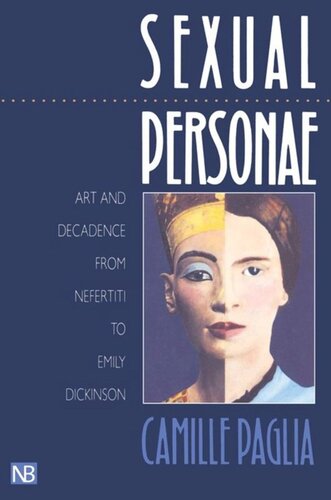

Most ebook files are in PDF format, so you can easily read them using various software such as Foxit Reader or directly on the Google Chrome browser.
Some ebook files are released by publishers in other formats such as .awz, .mobi, .epub, .fb2, etc. You may need to install specific software to read these formats on mobile/PC, such as Calibre.
Please read the tutorial at this link: https://ebookbell.com/faq
We offer FREE conversion to the popular formats you request; however, this may take some time. Therefore, right after payment, please email us, and we will try to provide the service as quickly as possible.
For some exceptional file formats or broken links (if any), please refrain from opening any disputes. Instead, email us first, and we will try to assist within a maximum of 6 hours.
EbookBell Team

0.0
0 reviewsIn this brilliantly original book, Camille Paglia identifies some of the major patterns that have endured in western culture from ancient Egypt and Greece to the present. According to Paglia, one source of continuity is paganism, which, undefeated by Judeo-Christianity, continues to flourish in art, eroticism, astrology, and pop culture. Others, she says, are androgyny, sadism, and the aggressive western eye, which has created our art and cinema. Paglia follows these and other themes from Nefertiti and the Venus of Willendorf to Apollo and Dionysus, from Botticelli and Michaelangelo to Shakespeare and Blake and finally to Emily Dickinson, who, along with other major nineteenth-century authors, becomes a remarkable example of Romanticism turned into Decadence.
Paglia offers provocative views of literature, art history, psychology, and religion. She focuses, for example, on the amorality, voyeurism, and pornography in great art that have been ignored or glossed over by most critics. She discusses sex and nature as brutal daemonic forces, and she criticizes feminists for sentimentality or wishful thinking about the causes of rape, violence, and poor relations between the sexes. She stressed the biologic basis of sex differences and sees the mother as an overwhelming force who condemns men to lifelong sexual anxiety, from which they escape through rationalism and physical achievement. She examines the culture and style of modern male homosexuals. She demonstrates how much of western life, art, and thought is ruled by personality, which she traces through recurrent types or personae such as the female vampire (Medusa, Lauren Bacall); the pythoness (the Dephic oracle, Gracie Allen); the beautiful boy (Hadrian's Antinous, Dorian Gray); the epicene man of beauty (Lord Byron, Elvis Presley); and the male heroine (Baudelaire, Woody Allen). Her book will stimulate and awe readers everywhere.